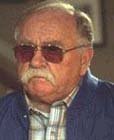
 |
|
| A Brimley-esque Cobb | |
The new body Cobb moves into -- built from Sta-Hi2 but modelled after a "grease monkey" gas station attendant -- also allows him to have new experiences which were not possible in his original hardware. When Cobb pays a mechanic to help him disguise the Mr. Frostee truck, he notices how comfortable he feels interacting with the man:
Cobb enjoyed their dealings very much. In his old body he had never been able to talk comfortably to garage mechanics. But now, with a random grease monkey's face, on a Sta-Hi shaped body, Cobb fit in at a filling station as easily as he used to fit in at research labs. Idly he wondered if Mr. Frostee could change the flicker-cladding enough to change him into a woman. That would be interesting. There was so much to look forward to! (Rucker 147).
Cobb's thoughts, while supposedly idle, are still suggestive of how renewable hardware could enable a person to alter his or her appearance, and improve his or her potential. Blemishes or physical limitations that people bear for a lifetime would only be short-term obstacles for a human-bopper. Like Cobb, they could have useful sub-routines included with their software to help them make mathematical computations, perhaps, or give them heightened strength (Rucker 113). Part of the attractiveness of the human-bopper meld Cobb exemplifies is that it is not only immortal, but it is free from many of the life-long limitations that normal humans must learn to endure.
Cobb furthermore is convinced that his soul has remained intact as he has become more bopper-like. In his final meeting with Sta-Hi, Cobb insists that his soul was not destroyed by being fitted into a computer program (Rucker 160). Cobb strongly believes that his mind's idea of self is just another idea that can be incorporated into computerized data (Rucker 143). This pragmatic view of the human soul is brought into question by Sta-Hi's objections, and by Cobb eventual reincarnation in the Mr. Frostee truck. However, because of his quasi-immortality and freedom from human limitations, Cobb is the strongest countercultural figure in Software.